Ethnography Report: Observation of Students in LNU Library
VerifiedAdded on 2020/02/05
|7
|2179
|224
Report
AI Summary
This ethnography report presents an observational study conducted at Linnaeus University's library in Växjö, Sweden. The study focuses on student behavior, interactions, and the overall academic environment. The researcher, acting as a marginal observer, documented student activities, including group study sessions, individual study habits, and interactions with library staff. The report details the methodology, including the subjective approach and ethical considerations, such as obtaining permission from the university management and maintaining the confidentiality of the students. The analysis highlights the library's role in fostering a learning environment and the importance of ethical research practices. The report also includes a review of relevant literature, emphasizing the reliability and validity of the observations. The study concludes with a reflection on the qualitative ethnographic methods used to gather and analyze data regarding student's behavior in the library.
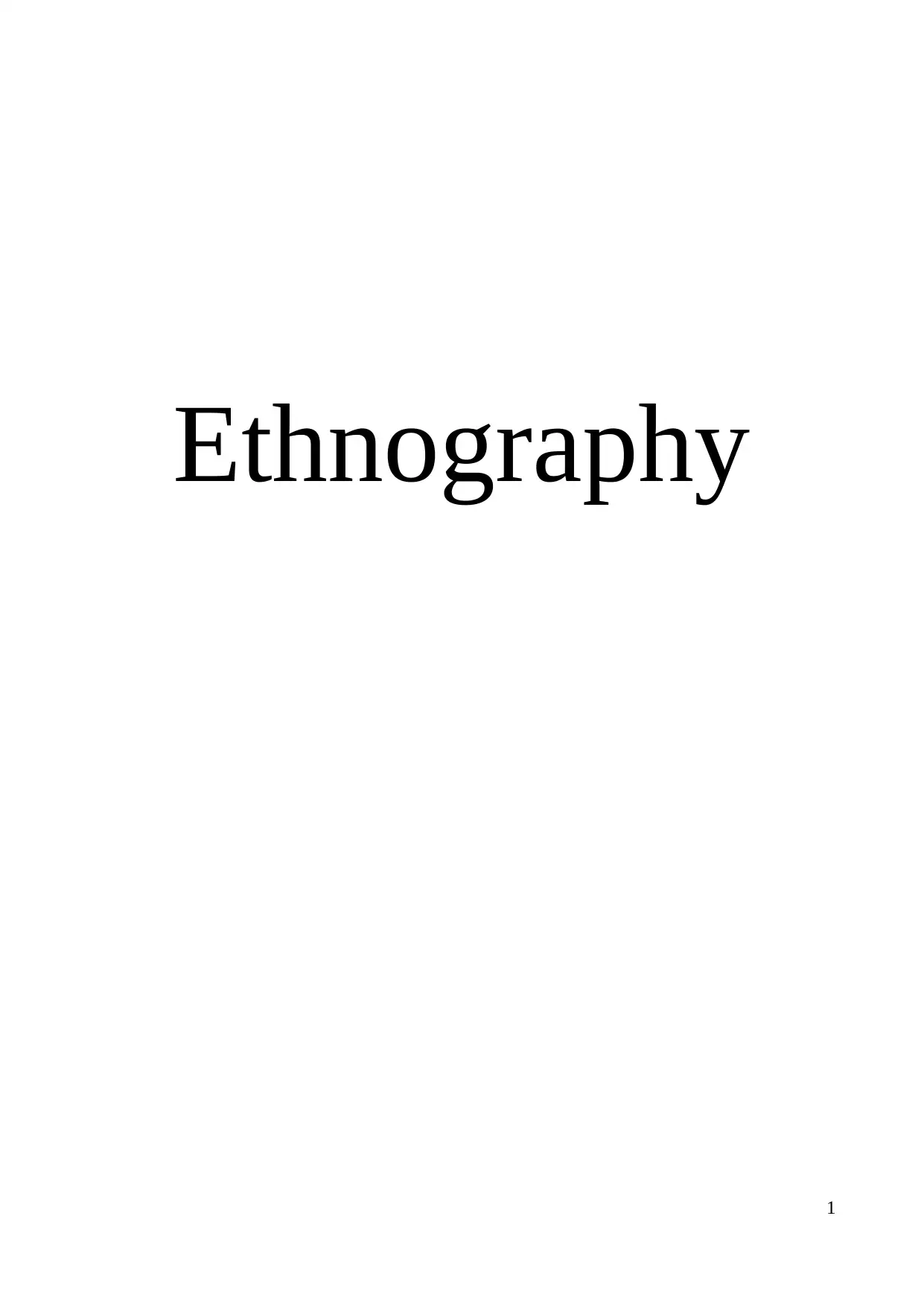
Ethnography
1
1
Paraphrase This Document
Need a fresh take? Get an instant paraphrase of this document with our AI Paraphraser
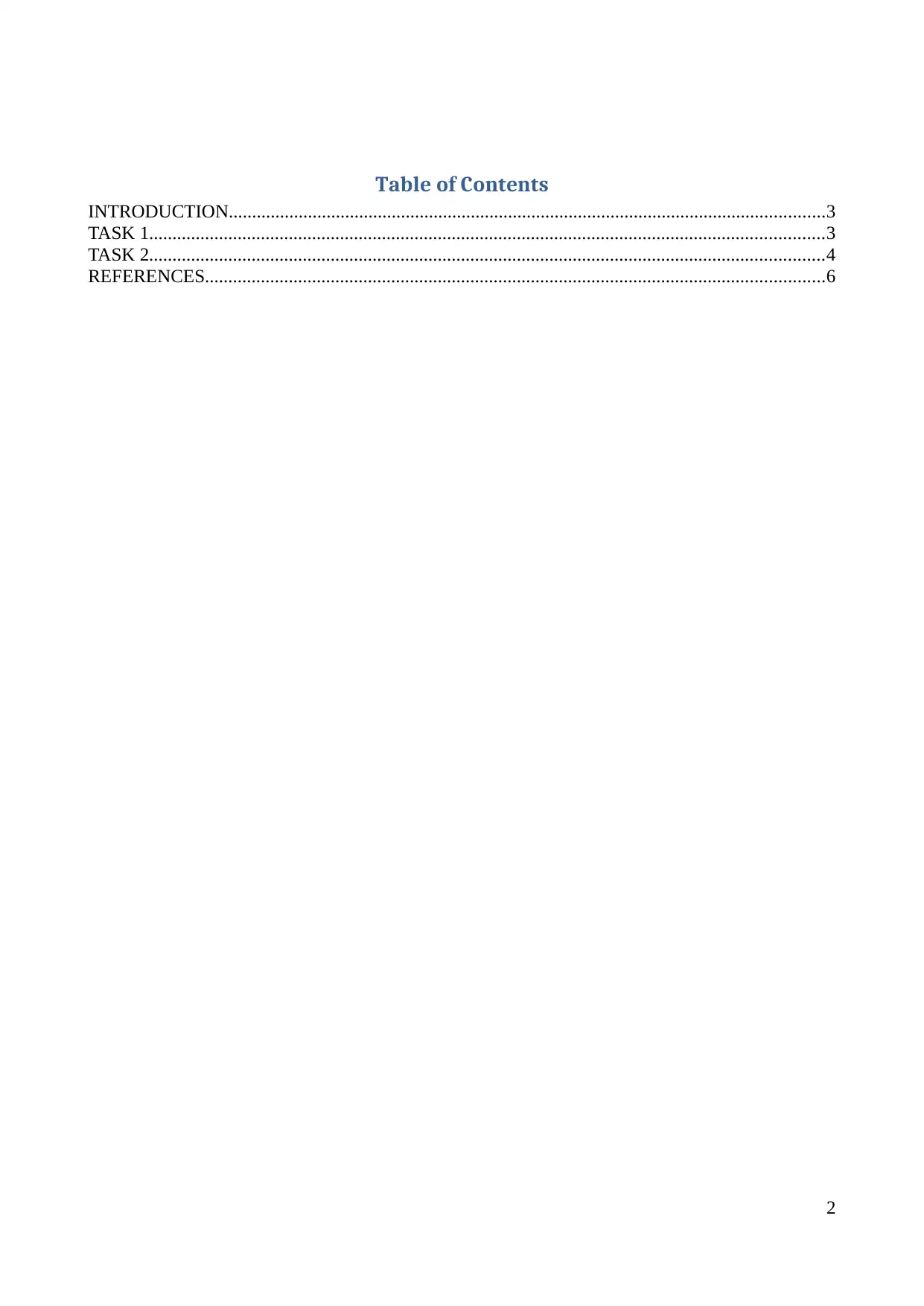
Table of Contents
INTRODUCTION................................................................................................................................3
TASK 1.................................................................................................................................................3
TASK 2.................................................................................................................................................4
REFERENCES.....................................................................................................................................6
2
INTRODUCTION................................................................................................................................3
TASK 1.................................................................................................................................................3
TASK 2.................................................................................................................................................4
REFERENCES.....................................................................................................................................6
2
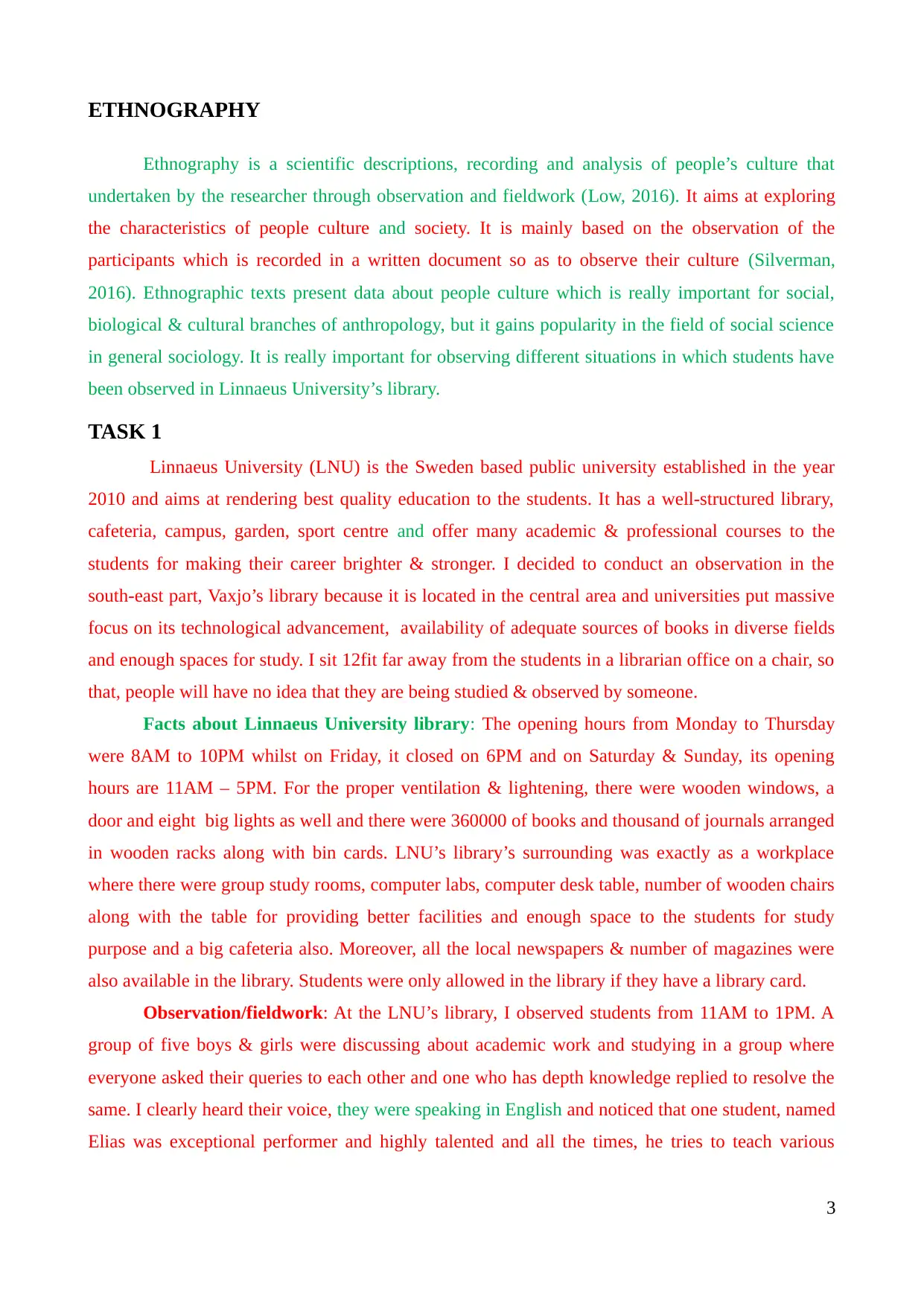
ETHNOGRAPHY
Ethnography is a scientific descriptions, recording and analysis of people’s culture that
undertaken by the researcher through observation and fieldwork (Low, 2016). It aims at exploring
the characteristics of people culture and society. It is mainly based on the observation of the
participants which is recorded in a written document so as to observe their culture (Silverman,
2016). Ethnographic texts present data about people culture which is really important for social,
biological & cultural branches of anthropology, but it gains popularity in the field of social science
in general sociology. It is really important for observing different situations in which students have
been observed in Linnaeus University’s library.
TASK 1
Linnaeus University (LNU) is the Sweden based public university established in the year
2010 and aims at rendering best quality education to the students. It has a well-structured library,
cafeteria, campus, garden, sport centre and offer many academic & professional courses to the
students for making their career brighter & stronger. I decided to conduct an observation in the
south-east part, Vaxjo’s library because it is located in the central area and universities put massive
focus on its technological advancement, availability of adequate sources of books in diverse fields
and enough spaces for study. I sit 12fit far away from the students in a librarian office on a chair, so
that, people will have no idea that they are being studied & observed by someone.
Facts about Linnaeus University library: The opening hours from Monday to Thursday
were 8AM to 10PM whilst on Friday, it closed on 6PM and on Saturday & Sunday, its opening
hours are 11AM – 5PM. For the proper ventilation & lightening, there were wooden windows, a
door and eight big lights as well and there were 360000 of books and thousand of journals arranged
in wooden racks along with bin cards. LNU’s library’s surrounding was exactly as a workplace
where there were group study rooms, computer labs, computer desk table, number of wooden chairs
along with the table for providing better facilities and enough space to the students for study
purpose and a big cafeteria also. Moreover, all the local newspapers & number of magazines were
also available in the library. Students were only allowed in the library if they have a library card.
Observation/fieldwork: At the LNU’s library, I observed students from 11AM to 1PM. A
group of five boys & girls were discussing about academic work and studying in a group where
everyone asked their queries to each other and one who has depth knowledge replied to resolve the
same. I clearly heard their voice, they were speaking in English and noticed that one student, named
Elias was exceptional performer and highly talented and all the times, he tries to teach various
3
Ethnography is a scientific descriptions, recording and analysis of people’s culture that
undertaken by the researcher through observation and fieldwork (Low, 2016). It aims at exploring
the characteristics of people culture and society. It is mainly based on the observation of the
participants which is recorded in a written document so as to observe their culture (Silverman,
2016). Ethnographic texts present data about people culture which is really important for social,
biological & cultural branches of anthropology, but it gains popularity in the field of social science
in general sociology. It is really important for observing different situations in which students have
been observed in Linnaeus University’s library.
TASK 1
Linnaeus University (LNU) is the Sweden based public university established in the year
2010 and aims at rendering best quality education to the students. It has a well-structured library,
cafeteria, campus, garden, sport centre and offer many academic & professional courses to the
students for making their career brighter & stronger. I decided to conduct an observation in the
south-east part, Vaxjo’s library because it is located in the central area and universities put massive
focus on its technological advancement, availability of adequate sources of books in diverse fields
and enough spaces for study. I sit 12fit far away from the students in a librarian office on a chair, so
that, people will have no idea that they are being studied & observed by someone.
Facts about Linnaeus University library: The opening hours from Monday to Thursday
were 8AM to 10PM whilst on Friday, it closed on 6PM and on Saturday & Sunday, its opening
hours are 11AM – 5PM. For the proper ventilation & lightening, there were wooden windows, a
door and eight big lights as well and there were 360000 of books and thousand of journals arranged
in wooden racks along with bin cards. LNU’s library’s surrounding was exactly as a workplace
where there were group study rooms, computer labs, computer desk table, number of wooden chairs
along with the table for providing better facilities and enough space to the students for study
purpose and a big cafeteria also. Moreover, all the local newspapers & number of magazines were
also available in the library. Students were only allowed in the library if they have a library card.
Observation/fieldwork: At the LNU’s library, I observed students from 11AM to 1PM. A
group of five boys & girls were discussing about academic work and studying in a group where
everyone asked their queries to each other and one who has depth knowledge replied to resolve the
same. I clearly heard their voice, they were speaking in English and noticed that one student, named
Elias was exceptional performer and highly talented and all the times, he tries to teach various
3
⊘ This is a preview!⊘
Do you want full access?
Subscribe today to unlock all pages.

Trusted by 1+ million students worldwide
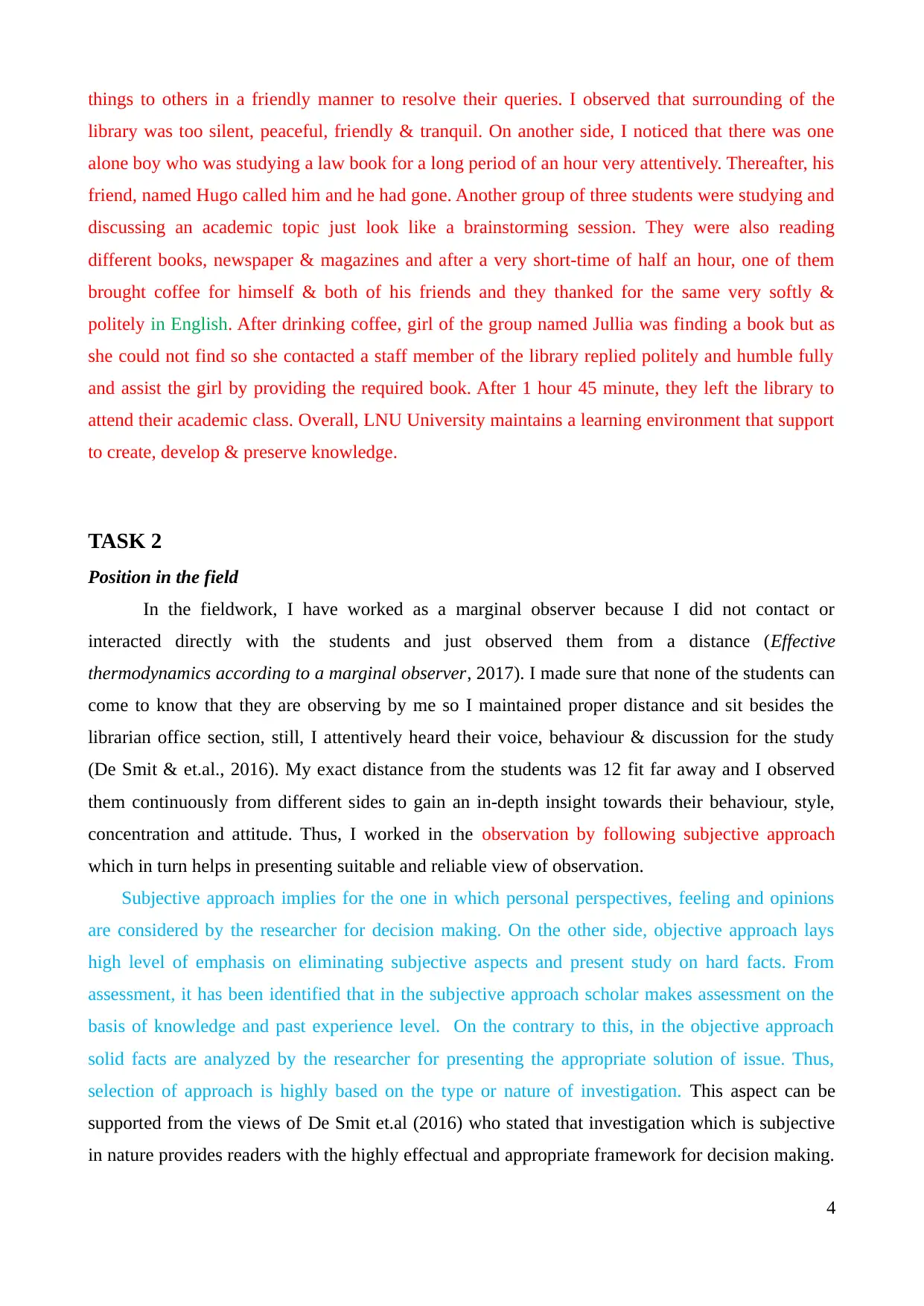
things to others in a friendly manner to resolve their queries. I observed that surrounding of the
library was too silent, peaceful, friendly & tranquil. On another side, I noticed that there was one
alone boy who was studying a law book for a long period of an hour very attentively. Thereafter, his
friend, named Hugo called him and he had gone. Another group of three students were studying and
discussing an academic topic just look like a brainstorming session. They were also reading
different books, newspaper & magazines and after a very short-time of half an hour, one of them
brought coffee for himself & both of his friends and they thanked for the same very softly &
politely in English. After drinking coffee, girl of the group named Jullia was finding a book but as
she could not find so she contacted a staff member of the library replied politely and humble fully
and assist the girl by providing the required book. After 1 hour 45 minute, they left the library to
attend their academic class. Overall, LNU University maintains a learning environment that support
to create, develop & preserve knowledge.
TASK 2
Position in the field
In the fieldwork, I have worked as a marginal observer because I did not contact or
interacted directly with the students and just observed them from a distance (Effective
thermodynamics according to a marginal observer, 2017). I made sure that none of the students can
come to know that they are observing by me so I maintained proper distance and sit besides the
librarian office section, still, I attentively heard their voice, behaviour & discussion for the study
(De Smit & et.al., 2016). My exact distance from the students was 12 fit far away and I observed
them continuously from different sides to gain an in-depth insight towards their behaviour, style,
concentration and attitude. Thus, I worked in the observation by following subjective approach
which in turn helps in presenting suitable and reliable view of observation.
Subjective approach implies for the one in which personal perspectives, feeling and opinions
are considered by the researcher for decision making. On the other side, objective approach lays
high level of emphasis on eliminating subjective aspects and present study on hard facts. From
assessment, it has been identified that in the subjective approach scholar makes assessment on the
basis of knowledge and past experience level. On the contrary to this, in the objective approach
solid facts are analyzed by the researcher for presenting the appropriate solution of issue. Thus,
selection of approach is highly based on the type or nature of investigation. This aspect can be
supported from the views of De Smit et.al (2016) who stated that investigation which is subjective
in nature provides readers with the highly effectual and appropriate framework for decision making.
4
library was too silent, peaceful, friendly & tranquil. On another side, I noticed that there was one
alone boy who was studying a law book for a long period of an hour very attentively. Thereafter, his
friend, named Hugo called him and he had gone. Another group of three students were studying and
discussing an academic topic just look like a brainstorming session. They were also reading
different books, newspaper & magazines and after a very short-time of half an hour, one of them
brought coffee for himself & both of his friends and they thanked for the same very softly &
politely in English. After drinking coffee, girl of the group named Jullia was finding a book but as
she could not find so she contacted a staff member of the library replied politely and humble fully
and assist the girl by providing the required book. After 1 hour 45 minute, they left the library to
attend their academic class. Overall, LNU University maintains a learning environment that support
to create, develop & preserve knowledge.
TASK 2
Position in the field
In the fieldwork, I have worked as a marginal observer because I did not contact or
interacted directly with the students and just observed them from a distance (Effective
thermodynamics according to a marginal observer, 2017). I made sure that none of the students can
come to know that they are observing by me so I maintained proper distance and sit besides the
librarian office section, still, I attentively heard their voice, behaviour & discussion for the study
(De Smit & et.al., 2016). My exact distance from the students was 12 fit far away and I observed
them continuously from different sides to gain an in-depth insight towards their behaviour, style,
concentration and attitude. Thus, I worked in the observation by following subjective approach
which in turn helps in presenting suitable and reliable view of observation.
Subjective approach implies for the one in which personal perspectives, feeling and opinions
are considered by the researcher for decision making. On the other side, objective approach lays
high level of emphasis on eliminating subjective aspects and present study on hard facts. From
assessment, it has been identified that in the subjective approach scholar makes assessment on the
basis of knowledge and past experience level. On the contrary to this, in the objective approach
solid facts are analyzed by the researcher for presenting the appropriate solution of issue. Thus,
selection of approach is highly based on the type or nature of investigation. This aspect can be
supported from the views of De Smit et.al (2016) who stated that investigation which is subjective
in nature provides readers with the highly effectual and appropriate framework for decision making.
4
Paraphrase This Document
Need a fresh take? Get an instant paraphrase of this document with our AI Paraphraser
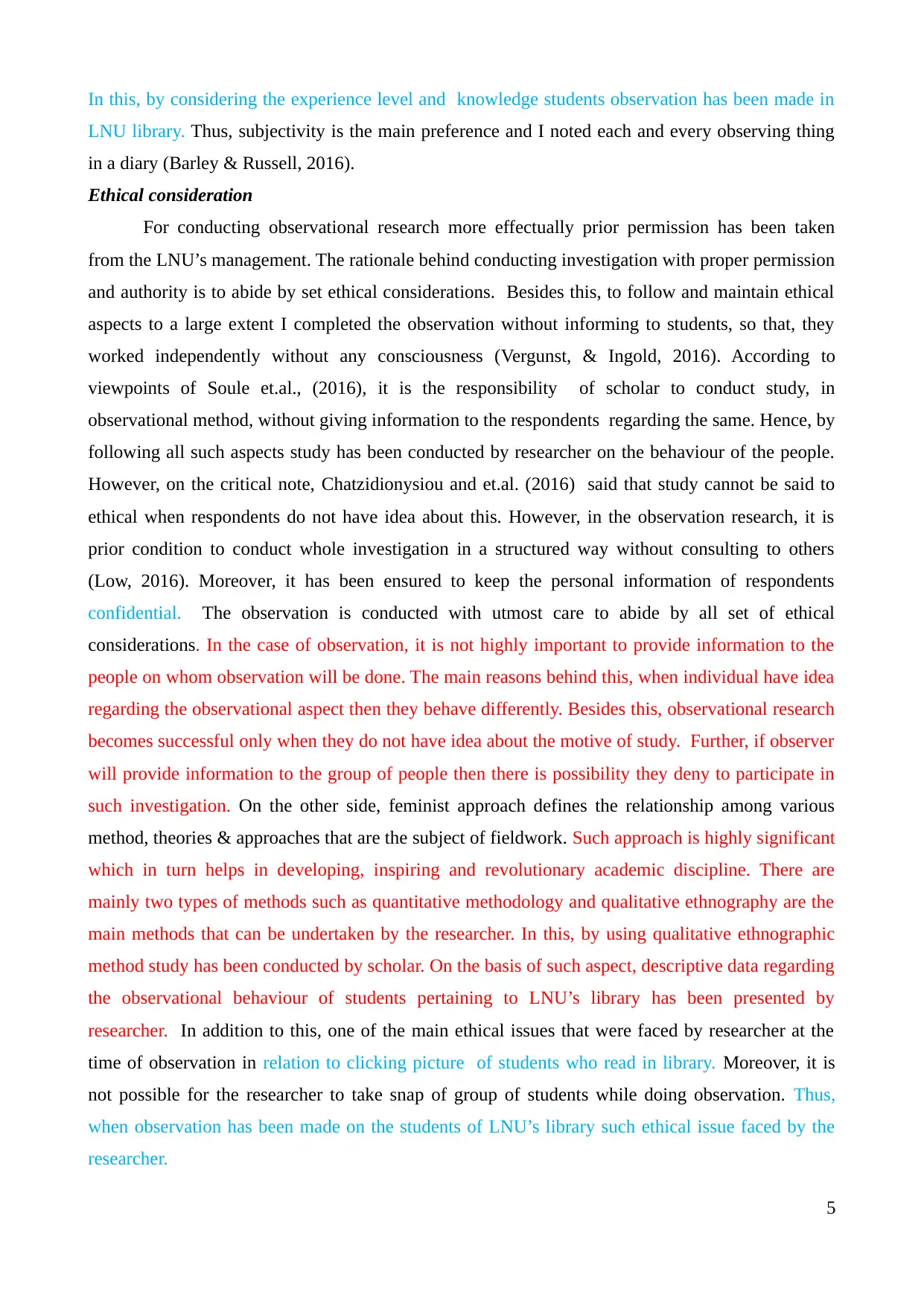
In this, by considering the experience level and knowledge students observation has been made in
LNU library. Thus, subjectivity is the main preference and I noted each and every observing thing
in a diary (Barley & Russell, 2016).
Ethical consideration
For conducting observational research more effectually prior permission has been taken
from the LNU’s management. The rationale behind conducting investigation with proper permission
and authority is to abide by set ethical considerations. Besides this, to follow and maintain ethical
aspects to a large extent I completed the observation without informing to students, so that, they
worked independently without any consciousness (Vergunst, & Ingold, 2016). According to
viewpoints of Soule et.al., (2016), it is the responsibility of scholar to conduct study, in
observational method, without giving information to the respondents regarding the same. Hence, by
following all such aspects study has been conducted by researcher on the behaviour of the people.
However, on the critical note, Chatzidionysiou and et.al. (2016) said that study cannot be said to
ethical when respondents do not have idea about this. However, in the observation research, it is
prior condition to conduct whole investigation in a structured way without consulting to others
(Low, 2016). Moreover, it has been ensured to keep the personal information of respondents
confidential. The observation is conducted with utmost care to abide by all set of ethical
considerations. In the case of observation, it is not highly important to provide information to the
people on whom observation will be done. The main reasons behind this, when individual have idea
regarding the observational aspect then they behave differently. Besides this, observational research
becomes successful only when they do not have idea about the motive of study. Further, if observer
will provide information to the group of people then there is possibility they deny to participate in
such investigation. On the other side, feminist approach defines the relationship among various
method, theories & approaches that are the subject of fieldwork. Such approach is highly significant
which in turn helps in developing, inspiring and revolutionary academic discipline. There are
mainly two types of methods such as quantitative methodology and qualitative ethnography are the
main methods that can be undertaken by the researcher. In this, by using qualitative ethnographic
method study has been conducted by scholar. On the basis of such aspect, descriptive data regarding
the observational behaviour of students pertaining to LNU’s library has been presented by
researcher. In addition to this, one of the main ethical issues that were faced by researcher at the
time of observation in relation to clicking picture of students who read in library. Moreover, it is
not possible for the researcher to take snap of group of students while doing observation. Thus,
when observation has been made on the students of LNU’s library such ethical issue faced by the
researcher.
5
LNU library. Thus, subjectivity is the main preference and I noted each and every observing thing
in a diary (Barley & Russell, 2016).
Ethical consideration
For conducting observational research more effectually prior permission has been taken
from the LNU’s management. The rationale behind conducting investigation with proper permission
and authority is to abide by set ethical considerations. Besides this, to follow and maintain ethical
aspects to a large extent I completed the observation without informing to students, so that, they
worked independently without any consciousness (Vergunst, & Ingold, 2016). According to
viewpoints of Soule et.al., (2016), it is the responsibility of scholar to conduct study, in
observational method, without giving information to the respondents regarding the same. Hence, by
following all such aspects study has been conducted by researcher on the behaviour of the people.
However, on the critical note, Chatzidionysiou and et.al. (2016) said that study cannot be said to
ethical when respondents do not have idea about this. However, in the observation research, it is
prior condition to conduct whole investigation in a structured way without consulting to others
(Low, 2016). Moreover, it has been ensured to keep the personal information of respondents
confidential. The observation is conducted with utmost care to abide by all set of ethical
considerations. In the case of observation, it is not highly important to provide information to the
people on whom observation will be done. The main reasons behind this, when individual have idea
regarding the observational aspect then they behave differently. Besides this, observational research
becomes successful only when they do not have idea about the motive of study. Further, if observer
will provide information to the group of people then there is possibility they deny to participate in
such investigation. On the other side, feminist approach defines the relationship among various
method, theories & approaches that are the subject of fieldwork. Such approach is highly significant
which in turn helps in developing, inspiring and revolutionary academic discipline. There are
mainly two types of methods such as quantitative methodology and qualitative ethnography are the
main methods that can be undertaken by the researcher. In this, by using qualitative ethnographic
method study has been conducted by scholar. On the basis of such aspect, descriptive data regarding
the observational behaviour of students pertaining to LNU’s library has been presented by
researcher. In addition to this, one of the main ethical issues that were faced by researcher at the
time of observation in relation to clicking picture of students who read in library. Moreover, it is
not possible for the researcher to take snap of group of students while doing observation. Thus,
when observation has been made on the students of LNU’s library such ethical issue faced by the
researcher.
5
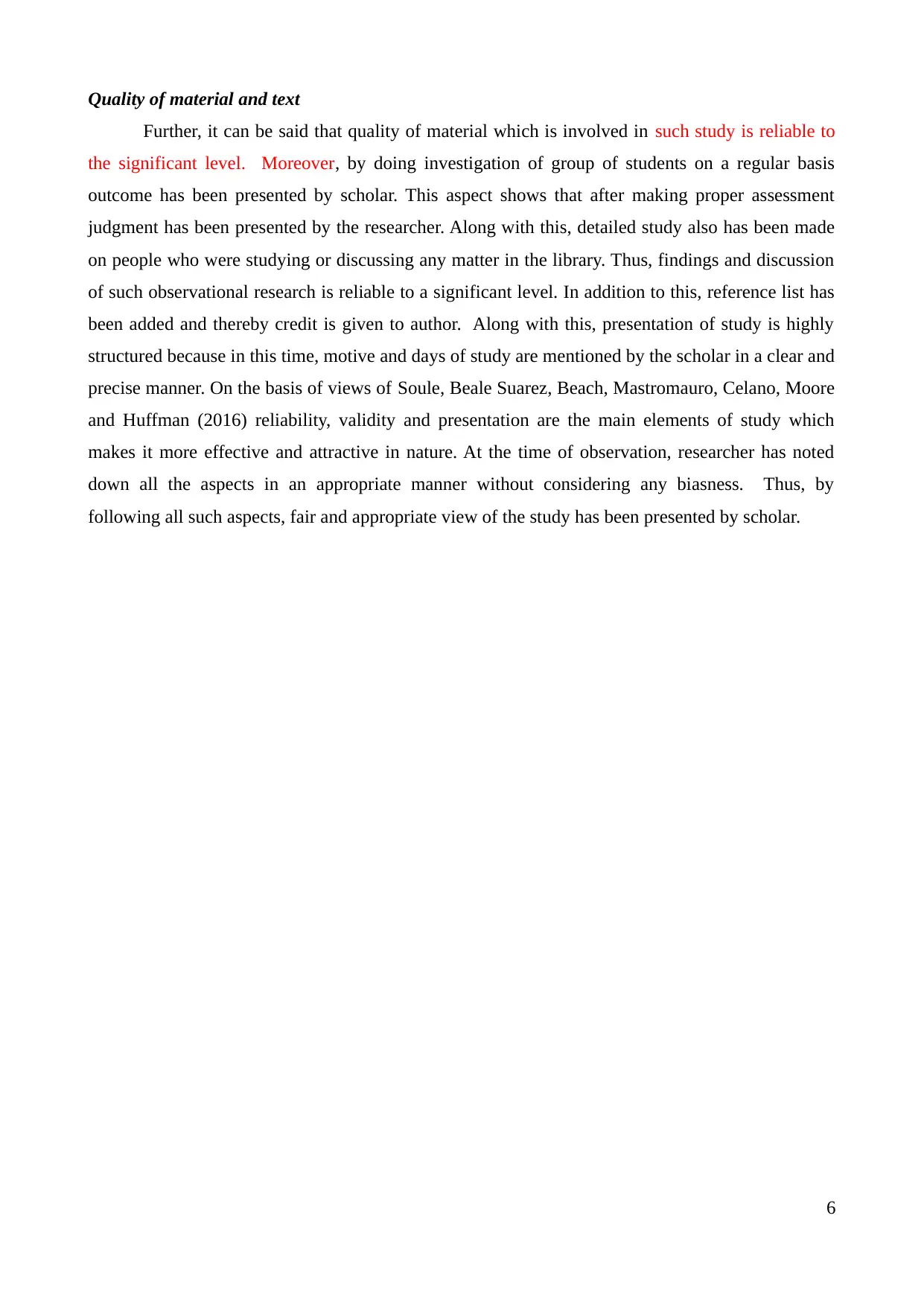
Quality of material and text
Further, it can be said that quality of material which is involved in such study is reliable to
the significant level. Moreover, by doing investigation of group of students on a regular basis
outcome has been presented by scholar. This aspect shows that after making proper assessment
judgment has been presented by the researcher. Along with this, detailed study also has been made
on people who were studying or discussing any matter in the library. Thus, findings and discussion
of such observational research is reliable to a significant level. In addition to this, reference list has
been added and thereby credit is given to author. Along with this, presentation of study is highly
structured because in this time, motive and days of study are mentioned by the scholar in a clear and
precise manner. On the basis of views of Soule, Beale Suarez, Beach, Mastromauro, Celano, Moore
and Huffman (2016) reliability, validity and presentation are the main elements of study which
makes it more effective and attractive in nature. At the time of observation, researcher has noted
down all the aspects in an appropriate manner without considering any biasness. Thus, by
following all such aspects, fair and appropriate view of the study has been presented by scholar.
6
Further, it can be said that quality of material which is involved in such study is reliable to
the significant level. Moreover, by doing investigation of group of students on a regular basis
outcome has been presented by scholar. This aspect shows that after making proper assessment
judgment has been presented by the researcher. Along with this, detailed study also has been made
on people who were studying or discussing any matter in the library. Thus, findings and discussion
of such observational research is reliable to a significant level. In addition to this, reference list has
been added and thereby credit is given to author. Along with this, presentation of study is highly
structured because in this time, motive and days of study are mentioned by the scholar in a clear and
precise manner. On the basis of views of Soule, Beale Suarez, Beach, Mastromauro, Celano, Moore
and Huffman (2016) reliability, validity and presentation are the main elements of study which
makes it more effective and attractive in nature. At the time of observation, researcher has noted
down all the aspects in an appropriate manner without considering any biasness. Thus, by
following all such aspects, fair and appropriate view of the study has been presented by scholar.
6
⊘ This is a preview!⊘
Do you want full access?
Subscribe today to unlock all pages.

Trusted by 1+ million students worldwide
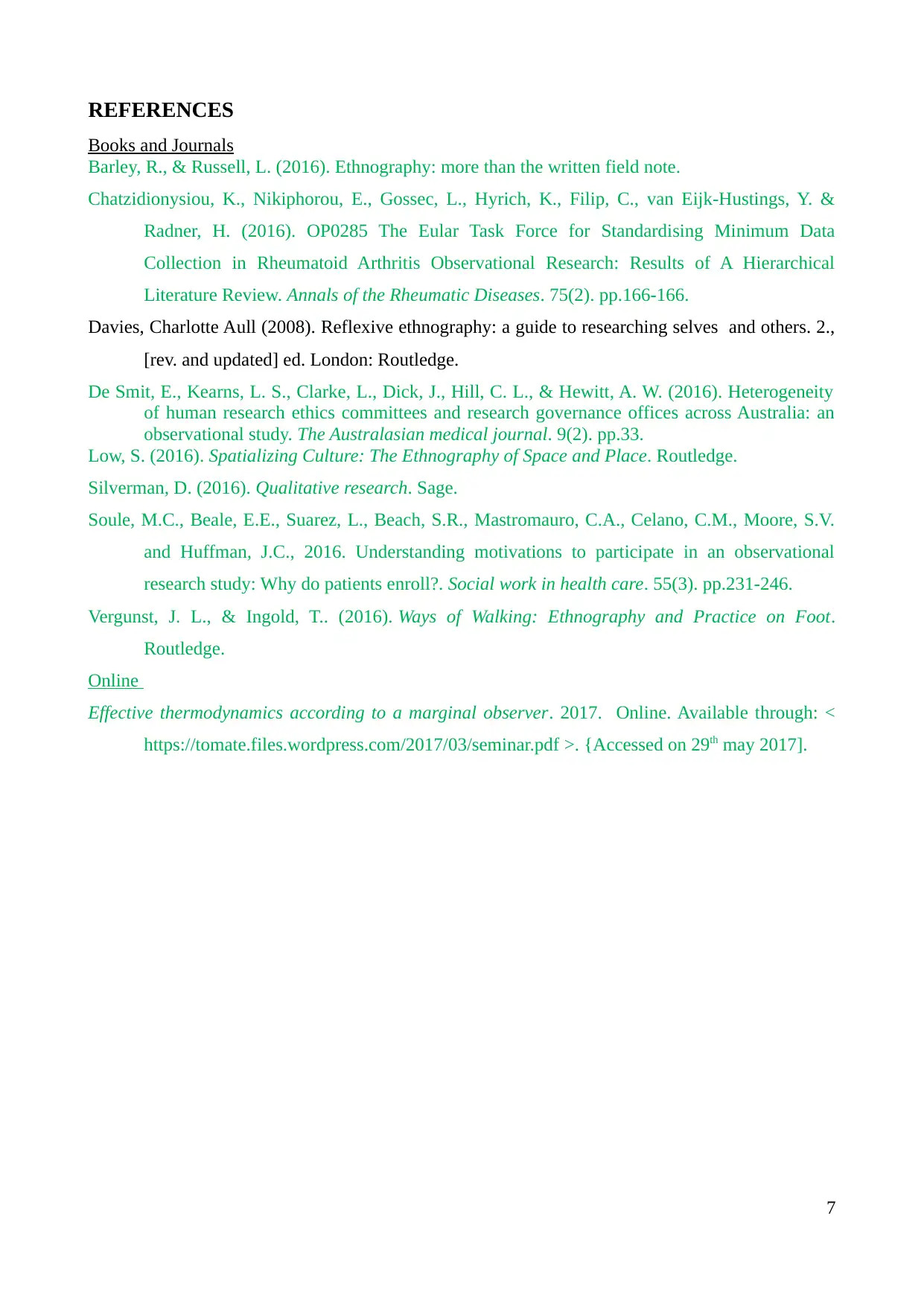
REFERENCES
Books and Journals
Barley, R., & Russell, L. (2016). Ethnography: more than the written field note.
Chatzidionysiou, K., Nikiphorou, E., Gossec, L., Hyrich, K., Filip, C., van Eijk-Hustings, Y. &
Radner, H. (2016). OP0285 The Eular Task Force for Standardising Minimum Data
Collection in Rheumatoid Arthritis Observational Research: Results of A Hierarchical
Literature Review. Annals of the Rheumatic Diseases. 75(2). pp.166-166.
Davies, Charlotte Aull (2008). Reflexive ethnography: a guide to researching selves and others. 2.,
[rev. and updated] ed. London: Routledge.
De Smit, E., Kearns, L. S., Clarke, L., Dick, J., Hill, C. L., & Hewitt, A. W. (2016). Heterogeneity
of human research ethics committees and research governance offices across Australia: an
observational study. The Australasian medical journal. 9(2). pp.33.
Low, S. (2016). Spatializing Culture: The Ethnography of Space and Place. Routledge.
Silverman, D. (2016). Qualitative research. Sage.
Soule, M.C., Beale, E.E., Suarez, L., Beach, S.R., Mastromauro, C.A., Celano, C.M., Moore, S.V.
and Huffman, J.C., 2016. Understanding motivations to participate in an observational
research study: Why do patients enroll?. Social work in health care. 55(3). pp.231-246.
Vergunst, J. L., & Ingold, T.. (2016). Ways of Walking: Ethnography and Practice on Foot.
Routledge.
Online
Effective thermodynamics according to a marginal observer. 2017. Online. Available through: <
https://tomate.files.wordpress.com/2017/03/seminar.pdf >. {Accessed on 29th may 2017].
7
Books and Journals
Barley, R., & Russell, L. (2016). Ethnography: more than the written field note.
Chatzidionysiou, K., Nikiphorou, E., Gossec, L., Hyrich, K., Filip, C., van Eijk-Hustings, Y. &
Radner, H. (2016). OP0285 The Eular Task Force for Standardising Minimum Data
Collection in Rheumatoid Arthritis Observational Research: Results of A Hierarchical
Literature Review. Annals of the Rheumatic Diseases. 75(2). pp.166-166.
Davies, Charlotte Aull (2008). Reflexive ethnography: a guide to researching selves and others. 2.,
[rev. and updated] ed. London: Routledge.
De Smit, E., Kearns, L. S., Clarke, L., Dick, J., Hill, C. L., & Hewitt, A. W. (2016). Heterogeneity
of human research ethics committees and research governance offices across Australia: an
observational study. The Australasian medical journal. 9(2). pp.33.
Low, S. (2016). Spatializing Culture: The Ethnography of Space and Place. Routledge.
Silverman, D. (2016). Qualitative research. Sage.
Soule, M.C., Beale, E.E., Suarez, L., Beach, S.R., Mastromauro, C.A., Celano, C.M., Moore, S.V.
and Huffman, J.C., 2016. Understanding motivations to participate in an observational
research study: Why do patients enroll?. Social work in health care. 55(3). pp.231-246.
Vergunst, J. L., & Ingold, T.. (2016). Ways of Walking: Ethnography and Practice on Foot.
Routledge.
Online
Effective thermodynamics according to a marginal observer. 2017. Online. Available through: <
https://tomate.files.wordpress.com/2017/03/seminar.pdf >. {Accessed on 29th may 2017].
7
1 out of 7
Your All-in-One AI-Powered Toolkit for Academic Success.
+13062052269
info@desklib.com
Available 24*7 on WhatsApp / Email
![[object Object]](/_next/static/media/star-bottom.7253800d.svg)
Unlock your academic potential
Copyright © 2020–2025 A2Z Services. All Rights Reserved. Developed and managed by ZUCOL.